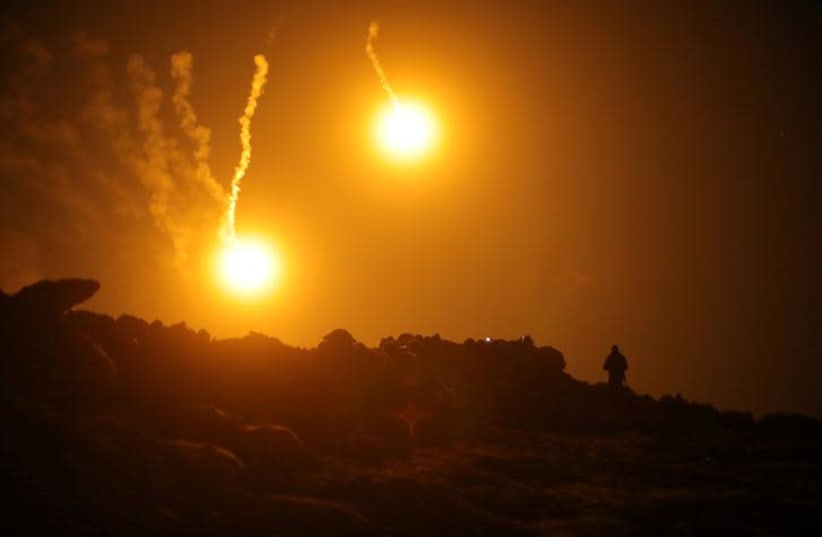An unnamed military source was quoted by SANA as saying that regime air defenses “responded to an Israeli aggression on the T4 airport in Homs eastern countryside, destroying two of the missiles that targeted the airport,” adding that the other Israeli rockets caused the death of one soldier and injured two others.#BREAKING: Possible Israeli strike on #Syria's T4 Airbase near Homs comes hours after #Israel's PM Netanyahu says #Israel will not tolerate missile attacks on its territory and will "respond forcefully to any aggression against it"
— Anna Ahronheim (@AAhronheim) June 2, 2019
An ammunition depot was destroyed in the strike and there was material damage to other buildings and equipment.The Syrian Observatory for Human Rights reported that five people were killed in the strike, which targeted warehouses at an Iranian Revolutionary Guard Corps military base.According to reports, multiple explosions were heard inside the airbase during the strike.Iran has been moving its assets from areas repeatedly struck by Israel to locations closer to the border with Iraq, specifically the T4 Airbase strategically located between Homs and Palmyra. Just yesterday, a Qeshm Fars Air jumbo jet returned to Iran from a possible arms delivery flight at T4.With a large presence of Iranian-backed troops in the area, both civilian and cargo airlines are used by the IRGC as a front for military transport flights bringing in soldiers and weaponry to bolster Iran’s military presence in Syria.Israeli officials have repeatedly voiced concerns over the growing Iranian presence on its borders and the smuggling of sophisticated weaponry to Hezbollah from Tehran to Lebanon via Syria, stressing that both are redlines for the Jewish state.Israel has admitted to having carried out a hundred airstrikes in Syria against Iranian and Hezbollah targets, and is suspected of carrying out hundreds of others.The strike came just hours after Prime Minister Benjamin Netanyahu said that Israel would not tolerate missile attacks on its territory and would “respond forcefully to any aggression against it.”“Yesterday, two missiles were fired toward Israel from Syrian territory,” Netanyahu said. “One struck inside Syria and the other hit our territory on the Golan Heights. I held security consultations following the attack, and I ordered the IDF to take strong action, which it did, striking several targets.”The Israel Air Force struck several Syrian military positions in southwestern Damascus and Quneitra, killing seven “foreign fighters” and three Syrian Armed Force (SAF) soldiers, and injuring seven others, in retaliation for the rockets fired earlier into northern Israel.The IDF confirmed that jets and attack helicopters struck a number of military targets in Syria, including two artillery batteries, a number of observation posts near the border, and an SA-2 air defense battery, in retaliation for the SAF rocket fire.“We struck a number of Syrian Armed Forces military targets,” the IDF said. “We hold the Syrian regime accountable and will firmly operate against any attempt to harm Israeli civilians.”The Syrian Observatory for Human Rights reported that the strike killed at least 10, including three Syrian troops and seven believed to be foreign fighters.Last year, an armed Iranian drone infiltrated into northern Israel, which the IDF claims was on a sabotage attack mission against the Jewish state. Two months later, a strike on the T4 airbase in Homs province blamed on Israel killed seven IRGC soldiers, including Col. Mehdi Dehghan, who led the drone unit operating out of the base.According to SANA one soldier was killed several others injured. An ammunition depot was also destroyed in #Israeli airstrike
— Anna Ahronheim (@AAhronheim) June 2, 2019
